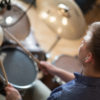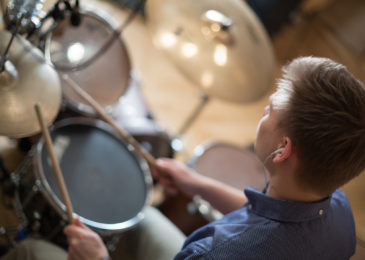Learning to play any instrument, especially the drums, is exciting but can be a bit daunting. Whether you began playing an instrument when you were young or are just looking to learn to keep your mind sharp, there are a lot of benefits to playing instruments. Taking the first step and signing up for lessons can be scary but the first lesson is so exciting that you really have nothing to be afraid of.
Picking a Teacher
It’s important to make sure that you get along with your music teacher. You will likely be spending a fair amount of time together and will be receiving criticism and advice from this person. If you feel as if your personalities don’t mesh or you don’t respect what he or she has to say, you will have a hard time taking your lessons seriously. This will result in you getting frustrated and feeling as though you are wasting time and money.
Goal of the First Lesson
During your first lesson, you will likely get to hear your teacher play and will talk about your expectations for the class. Learning to play for personal enjoyment is a very different goal than wanting to play in a band. Bring along some of your favourite music so that your teacher can see what style you want to practice. Classical music is beautiful but may not be what you want. For drums in particular, learning to play rock music is a great way to focus your skills.
Posture and Instrument Positioning
One of the most important parts of playing an instrument is making sure that your posture and positioning with the instrument are correct. If you are not holding your drum sticks correctly, you will soon get tired while playing. Likewise, slouching in your seat will make your back ache the next day and you’ll want to avoid practice. The best way to learn good posture while playing is to enrol for drum lessons in Singapore.
Practice
If you don’t have an instrument at home to practice, you will either need to buy one or find a company that you can rent from. While buying is quite the investment, as instruments are generally very expensive, renting can feel as if you are throwing money away. A good way to handle this predicament is to rent until you know for sure that you want to continue with your lessons. Then, when you do purchase your instrument, you don’t have to worry about quitting lessons a few months after spending a lot of money.
Lessons
Depending on your budget and the time you have during the day to take lessons, you may choose a shorter lesson of half an hour or a longer one of an hour. Both have their benefits and both can be very challenging with the right teacher. Opting for one-on-one lessons with a drum teacher will cost more but you are sure to get the attention that you want and need. Group lessons are a great way to get a feel for an instrument without the pressure of spending a lot of money.
Music lessons will keep your mind sharp and give you a fun and interesting hobby. Drummers have the added bonus of being able to keep the rhythm during songs and practice most anywhere. In lieu of using a loud instrument, practicing on a pillow with drumsticks will help you learn the beat.





